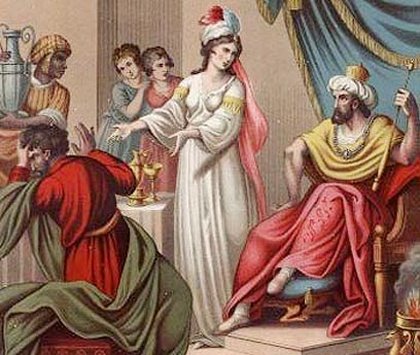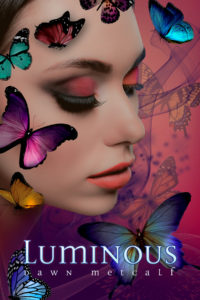Yesterday was Purim, the Jewish "dress up" holiday and another one of those "thank goodness we weren't wiped off the face of the earth!" celebrations. Coincidentally, it was also World Read Aloud Day which was perfect for the reading of the Megillah, the story of Queen Esther. (For a quick-ref of the story, click here.) And while I get something new out of every year's reading, I listened this year as a YA author and thought, "Why mention Vashti?"
Vashti was the first noble wife of the King of Persia, King Ahasuerus, known as "Xerxes" in Greek. The king is portrayed as a sot and a fool with a petty, violent streak, smug about his power and his beautiful wife, and during one of his many drunken parties, he commanded Vashti to appear so he could show her off to his friends. She was hosting a dinner of her own for the noble ladies and refused. Humiliated, the king acted hastily and declared she be banished, divorcing her instantly. This is the last we hear of Vashti and the tale goes on to focus on the king's new queen, the beautiful Esther who is a Jew and does not reveal this until she steps up to the king in order to save her people from the decree of his vizier, Haman.

Image gakked from Jewishhistory.org blog but unfortunately, I can't trace down the original artwork.
Vashti is included in the story of Esther, important enough to be remembered in history and recounted each year. I remember as a girl dressing up in princess costume but everyone wanted to be Esther, no one wanted to be Vashti, who was often portrayed more like the evil stepmother in Disney fairy tales. Now my brain wondered why.
Stepping back, I'd imagine being summoned away from her duties where she was being a dignified queen and proper hostess to other noble friends to be paraded in front of a bunch of debauched men would have been not only improper, but also humiliating and potentially dangerous: I'm certain having a husband known as a drunk and an idiot was no picnic and carried personal dangers for his wife and any of the concubines or women in the palace or any of the 127 provinces he ruled over at the time. Perhaps fearing for her safety, her honor, her person or her pride, Vashti did not obey his command and is punished with divorce and banishment. End of story. It seems a harsh lesson and what does it tell us (or our little girls in crowns and party dresses sitting nearby)?
Most likely, Vashti is an example to show what happens when women anger the king or go against his decrees, to underline the risks involved when Esther swallows her fear and takes her cousin, Mordechai's, advice to speak to the king about saving the Jews. The king had already given Haman permission to do whatever he wanted to the people who would not bow down to him, so this impresses that the danger isn't simply one person or one people, it is personal on both accounts: Esther risks everything by voicing a counter to the king and revealing herself; she can be banished or killed either as a defiant queen or one of the Jews. But I know Esther's story, I know her role and her motivations and I know what happens in the Purim story that brings the downfall of Haman and honors the loyal Mordechai, where Queen Esther and the foolish king somehow still live happily ever after (I guess). My mind is captured by Vashti.
In this current trend of emphasizing "strong female protagonists" and what that looks like or what does that mean, the idea of standing up for yourself, your safety, and your beliefs is core. Vashti did those things all on her own. Esther had to be prodded, but still did them, which shows another kind of courage. Vashti is strong-willed, enough to defy the king reasonably and rationally, attempting to save face. Esther is meek and in a tenuous position, her strength coming from overcoming her fears. Esther is rewarded. Vashti is exiled. Both are described as "beautiful" but neither is described as "strong" and only one described as "brave" and I think that's unfair. Vashti and Esther, Lessons One and Two, Prideful and Meek, whisper the potential of our Wonder Women, our Xenas, our Katniss Everdeens: the ones who stand up and face the unknown, for the good of others and to safeguard herself.
In my author's soul, I write a better life for Vashti, no longer saddled to a drunken fool, she is welcomed back into her noble family or finds herself able to pull ties amongst her understanding friends who help guide her to a place of safety and even luxury for someone who can value that a woman of valor's price is far beyond rubies. (A phrase often changed to "a woman of virtue" which has other intonations than "valor"!)
Who is the strong female protagonist of this story? Me, I'm starting to wonder.
(One article of the role of the women in this story can be found here.)


up with Vashti!
Esther is an annoying little obeyer.
Woman Rule
Esther *does* do something brave by speaking up, let’s give credit where it’s due (even though, yeah, I’m more in Camp Vashti).